After blocking new solar projects, Mohave County paves way for gas-fired power plant
Protests are heating up against a proposed gas-fired power plant in Fort Mohave, a rural community in Arizona's Mojave Desert where last October county officials passed a moratorium on new renewable energy projects.
A few weeks after the moratorium vote, the Mohave Electric Cooperative, a utility based in nearby Bullhead City, began seeking approvals to build natural gas turbines in the area, about 100 miles south of Las Vegas in one of America's sunniest expanses of open land. The peaker plant would generate 98 megawatts of electricity, just under the 100 MW limit that, under Arizona law, calls into action a committee designed to provide a "forum for interested and affected individuals."
Residents living less than half a mile from of the project site, in the Valley View at Sunrise Hills neighborhood, say communications have more than fallen short of that forum. The group of mostly retirees organizing under the name "Not in Any Neighborhood" say there is no reason for a peaker plant — one of the most polluting and expensive ways to produce electricity after coal — to be built that close to their homes.
They believe MEC has not been forthcoming about its plans or responsive to resident concerns about detrimental impacts the plant's proximity could have on their health, safety, property values and quality of life.
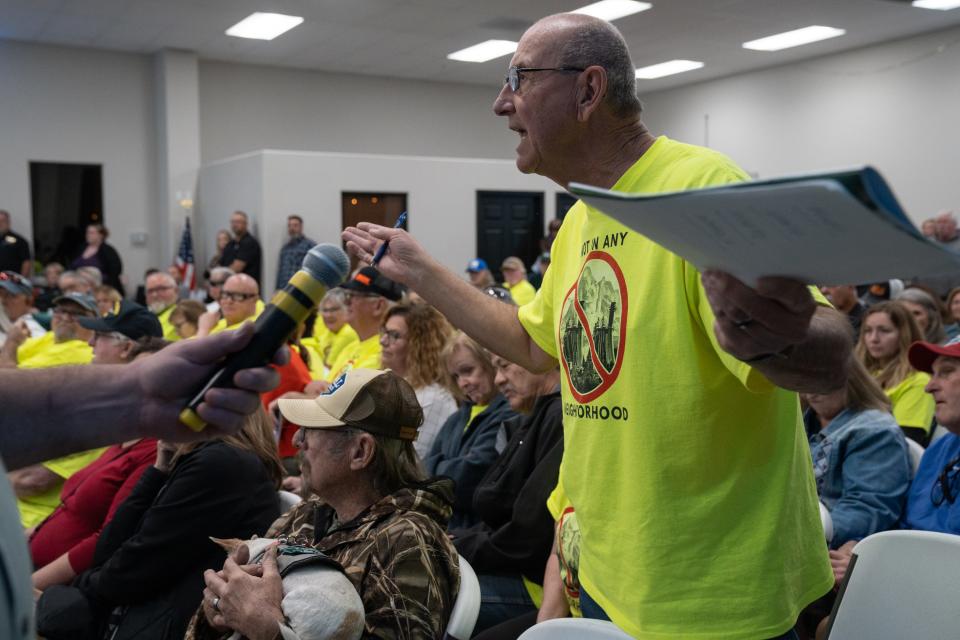
Patrick Ledger, executive vice president and CEO of the Arizona Generation and Transmission Cooperatives, which includes MEC, told The Arizona Republic the project is necessary to maintain affordable energy reliability in the region and is not related to the ban on solar, which is set to expire in June. As a local utility, MEC is exempted from the ban, which includes wind projects and only applies to private land.
Read the longer story with full details: A solar ban, a gas power plant and the rural retirees firing back at dirty energy
Beyond the immediate vicinity, the situation is also raising alarm bells about what building another fossil-fueled power plant in a region known for its solar energy potential would say about progress toward the clean energy transition as the most promising solution to climate change.
"These utilities are taking advantage of weak (state) protections" said Sandy Bahr, who directs the Grand Canyon Chapter of the Sierra Club. "The end result will be more harm to our air, our water, our climate and our health."
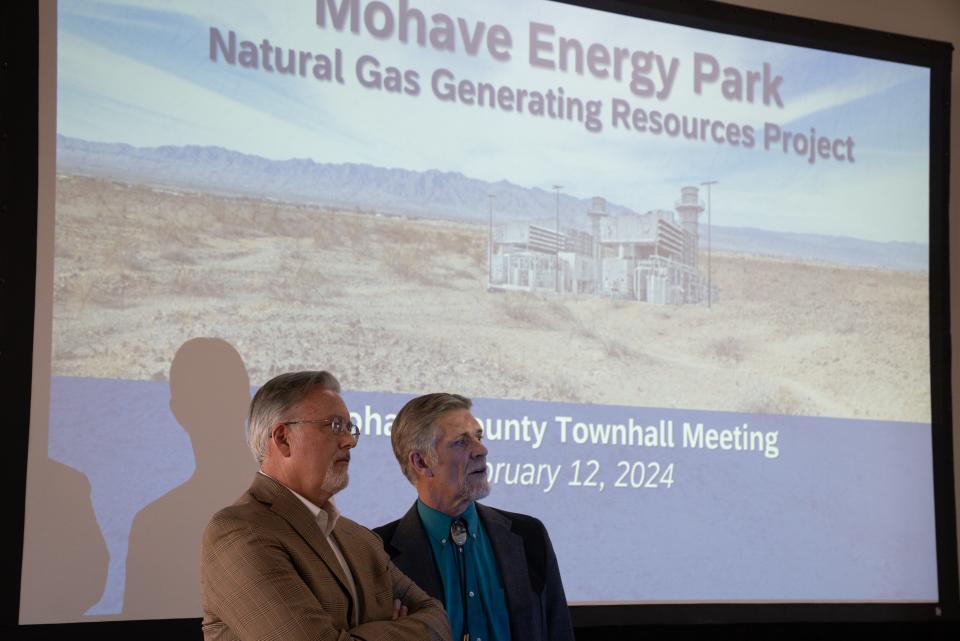
Mixed messaging on fossil fuels vs. solar energy
The utility has described its planned Mohave Energy Park as cleaner and more efficient than older turbine models. In a brochure handed out to residents, they call the project "not your grandpa's power plant," and estimate its upgraded turbine engines and filtration will drastically reduce emission of pollutants harmful to respiratory and heart health.
But air quality experts say it's still not a reasonable choice given climate change and energy alternatives.
“Whether or not the new turbine they are planning to use is better, to me that sort of misses the point that this is, in general, old technology and it’s got all these documented issues with it," said Lucas Henneman, an environmental engineering professor at George Mason University who researches air pollution and climate change. "They’re not the way forward as I see it.”
MEC's promotional materials make no mention of greenhouse gases like methane (the main ingredient of natural gas) or carbon dioxide (a common byproduct of combustion), nor any efforts to be mindful of their climate warming impacts.
Instead, the utility has focused its messaging on Fort Mohave's need for additional electricity generation to power essential services. In March, they put up a billboard claiming that "Natural Gas Power Generation Supports Hospitals" and ran a newspaper ad that "Natural Gas Power Generation Supports Cooling Centers," the public facilities meant to help shield residents from triple-digit summer temperatures.
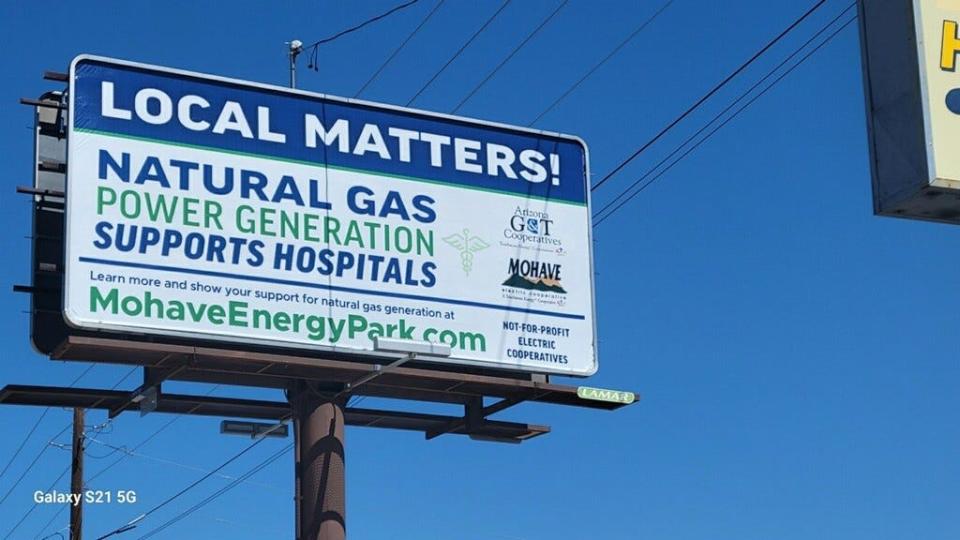
Mac McKeever, a Sunrise Hills resident and community organizer, told The Republic he's also started hearing MEC's CEO Tyler Carlson on the local radio hourly, underscoring the need for this facility.
But experts say that powering emergency services is not what peaker plants, meant to meet spikes in demand during hours of peak usage, are for. And while Sunrise Hills residents recalled many local power outages caused by infrastructure failures, none could remember one that was the result of a shortage.
Their neighborhood is not powered by MEC, but by Unisource, its local competitor.
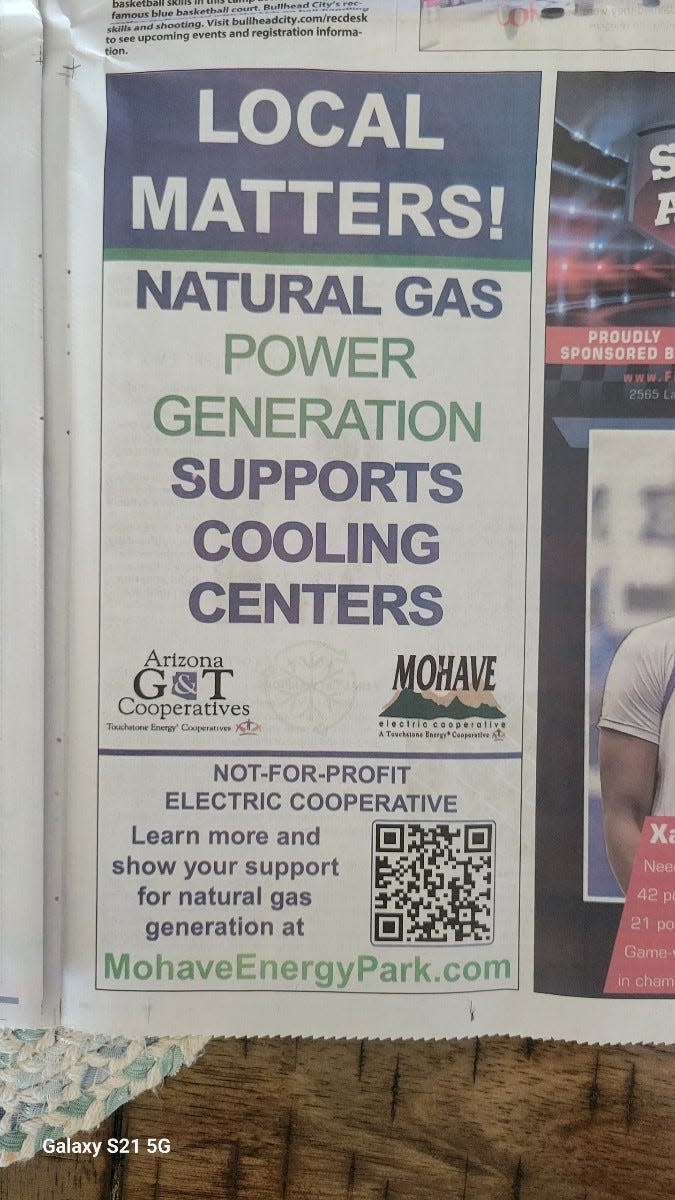
Troy Rule, a law professor at Arizona State University and a solar energy expert, views the push for this peaker plant as part of a trend he calls "local opposition as the new front against renewable energy." He sees no reason why, with battery storage and grid connectivity, solar panels couldn't meet Mohave County's needs. Renewables are likely even cheaper and more reliable given Arizona's lack of natural gas reserves, he said.
"Fossil fuel-aligned interests are realizing that another avenue for slowing the growth of renewable energy in the U.S. is to persuade neighbors to oppose projects," Rule said.
NIMBYism in action: The Phoenix area cities talking up green building while sending lobbyists to oppose affordable housing
Mohave County has seen a lot of solar development in recent years, especially on public lands, spurring some residents to describe the area as "under attack by huge utility-scale renewable energy projects."
County Supervisor Ron Gould described the October ban on renewable energy projects as an attempt to "let our staff get ahead of it," and a reaction to "these things just coming in like gangbusters because of the Biden administration putting a bunch of money out there for solar." Gould voted for the moratorium but opposes the peaker plant in Fort Mohave, saying it would be too close to the homes of his constituents.
Other supervisors did not respond to requests for comment.
In November, just after the solar ban had passed, MEC filed a request to extend expired manufacturing zoning of their "Site A" for the peaker plant, just over a dirt berm from the Sunrise Hills neighborhood. McKeever and other residents believe the way county officials handled that request was deceitful and sneaky.
In February, they asked Arizona Attorney General Kris Mayes to look into the legality of the project at its planned location.
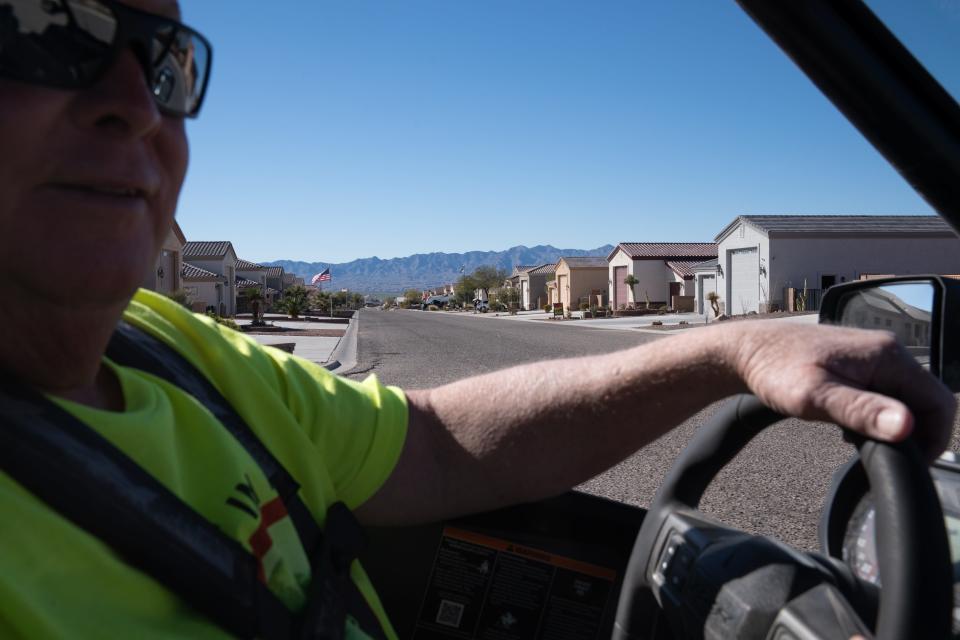
Bahr of the Sierra Club views it all as part of Arizona's pattern of paving the way for polluting projects while claiming support for renewables. She says there are currently 36 natural gas turbine projects quietly making their way through the state's permitting pipeline, even as leaders have welcomed 14,000 jobs and over $10 billion in federal clean energy investments.
MEC executives maintain they have no choice but to pursue these turbines given the utility's existing reliance on solar, which makes up 14% of its energy portfolio, and the anticipated closure of its coal unit due to environmental regulations.
"The only way to have the same energy reliability as we had before with coal is to diversify your energy sources," Ledger told The Republic, adding that MEC has already pursued all possible federal funding for renewables through President Joe Biden's Bipartisan Infrastructure Law and Inflation Reduction Act.
'To put in any natural gas power plant given our current climate and air quality is insane'
For the seniors living in the Sunrise Hills community, the priority is keeping this peaker plant away from their homes. Some, like Kari Taylor, suffer from debilitating asthma exacerbated by even small amounts of air pollution and moved to Fort Mohave specifically for its clean air.
“Anybody with heart issues will have the same problems," Taylor said, estimating that a majority of her neighbors suffer from something similar. "Air pollution will impair their breathing abilities and the oxygen getting to their heart."
The project site is also within three miles of several schools, daycare centers and land belonging to the Fort Mojave Indian Tribe.
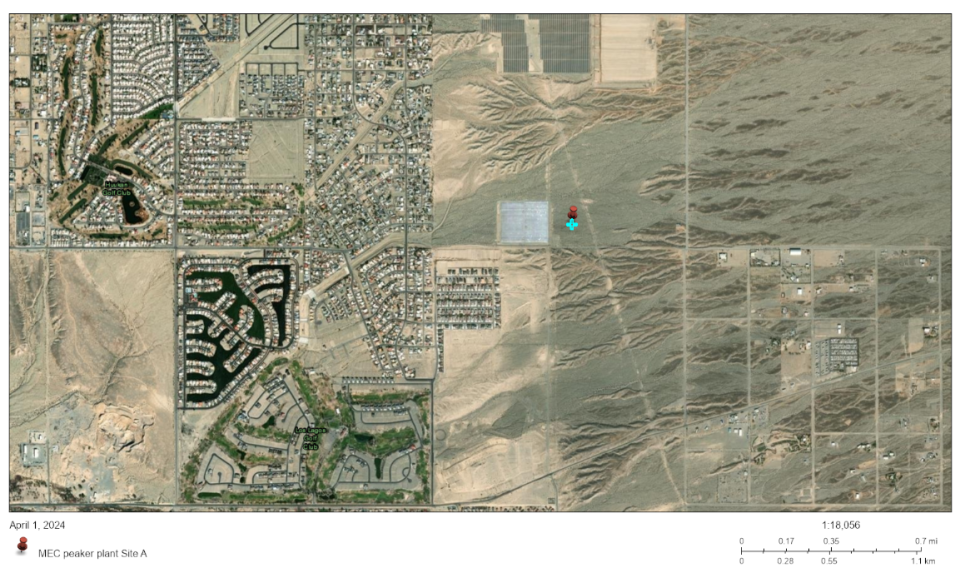
At a public meeting about the project Feb. 12, Ledger promised residents MEC would look for other locations, but warned that process would delay the electricity's expected 2026 availability and increase its cost. Electricity prices in Arizona are already lower than the national average.
On March 18, Carlson told the Mohave County Board of Supervisors that the search for alternative sites has been "resource intensive" and so far unpromising.
Meanwhile, medical and climate experts remain steadfast that building new natural gas facilities anywhere is unacceptable.
“To put in any natural gas power plant given our current climate and air quality is insane," said Eve Shapiro, an Arizona-based physician active on issues related to public health and social responsibility. "All this greenwashing stuff, we’ve heard it all but basically, we’ve got to get away from these power plants.”
Read our climate series: The latest from Joan Meiners at azcentral, a column on climate change
The attorney general's office told The Republic in late March they "have not made any determinations on the (project's) legality." While residents wait, they are taking additional steps to fight this facility and others like it.
On Wednesday, McKeever and others traveled to Kingman and spoke at a Mohave County Planning and Zoning Commission meeting, requesting policy amendments to require special use permits for utility power stations and expand the notification radius. But days earlier, Matthew Gunderson of Mohave County Development Services had notified McKeever he planned to recommend they deny it, and he did. The Commission directed McKeever to consider revising the request to soften its impact on existing zoning.
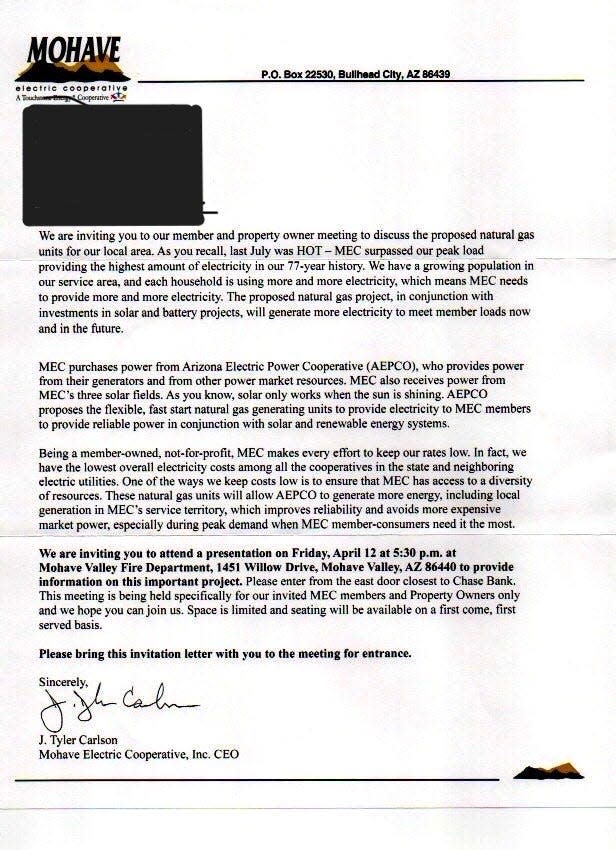
Next, MEC will host an invitation-only meeting Friday for co-op members and property owners about the project. Sunrise Hills residents closest to the site were not invited.
The Republic will continue to monitor this situation. Check back for ongoing coverage and see our longer initial story for many more details.
This report was made possible in part by a grant from the Fund for Environmental Journalism of the Society of Environmental Journalists.
Joan Meiners is the climate news and storytelling reporter at The Arizona Republic and azcentral.com. Before becoming a journalist, she completed a doctorate in ecology. Follow Joan on X at @beecycles or email her at joan.meiners@arizonarepublic.com. Read more of her coverage at environment.azcentral.com.
Sign up for AZ Climate, The Republic's weekly climate and environment newsletter.
Support climate coverage and local journalism by subscribing to azcentral.com at this link.
This article originally appeared on Arizona Republic: In rural Arizona, officials ban solar but approve a gas power plant

